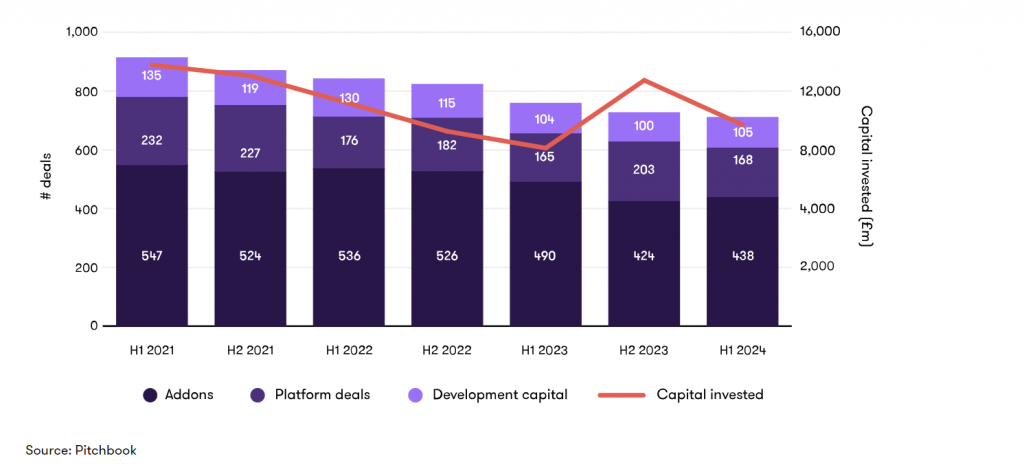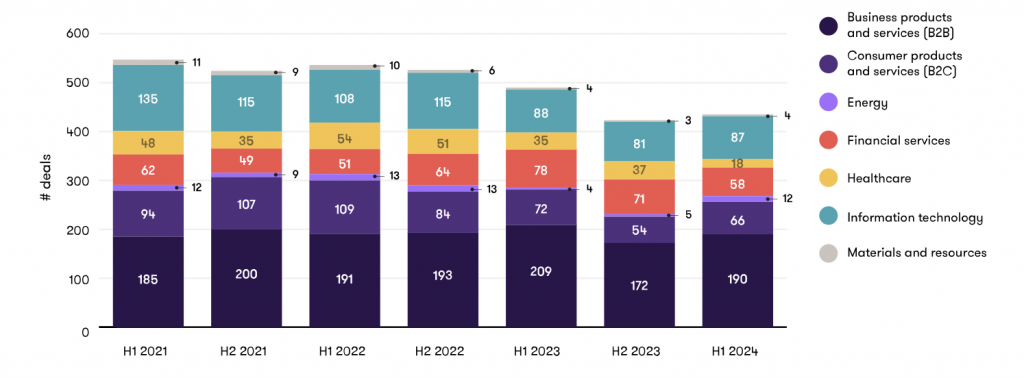Market conditions ‘driving confidence’ and an increase in private equity deals

Grant Thornton’s Private Equity Insights covering the first half of 2024 find that after a delayed start, PE deals are picking up – the anticipation of more favourable market conditions is driving confidence.

In a difficult fundraising environment, investors are more selective with their acquisitions, with processes accompanied by enhanced due diligence.
The outlook

Pete Terry, head of private equity, Grant Thornton
Pete Terry, partner and head of private equity, said: “Even though we haven’t seen the rush of deals predicted at the start of Q1, the current uptick bodes well for the next six months. The public markets are predicted to open up this year. They’re a reliable bellwether for the private markets.
“Now that we’ve passed through the General Election, we’re going to have more deals, although the effect will probably be delayed. Some deals that would have closed in Q3 were paused by the political uncertainty, and we’re likely to see them close in Q4.
“Some funds have also been holding on to assets longer than they intended and want to be ready to go to market after the summer. They need to do a deal, so we’re likely to see more secondaries.
“These developments all point to a return to ‘normal’ circumstances: Brexit, COVID-19; ‘Trussonomics’; the cost of living crisis, have all felt like temporary disruptions, but perhaps we should be thinking of this type of event as ‘normal’. Adaptability and finding opportunities for confidence in difficult circumstances should be business as usual.
“There are positive signs that conditions are getting easier, the markets are upbeat, inflation is declining and there are signs that interest rates will be cut. Political stability looks set for the next few years and Labour have repeatedly committed to prioritising growth.”
How did private equity play out?

Humza Khan, Grant Thornton
Funds’ performance has depended upon their ability to draw and deploy the right level of external debt. Funds which have been able to raise bridge loans and equity for transactions have been more active than funds historically dependent on bank financing.
Humza Khan, director and head of private equity coverage at Grant Thornton, said: “There are signs market conditions are settling down now, with a new Government in place providing much-needed stability.
“Inflation is falling and, although still high, rates have peaked, which means valuations are stabilising. Deals are picking up and overall volume looks set to increase in late Q3 and Q4.”
Total UK PE-buyout value and growth capital deal
Overall volume and value H1 2021-2024
Total UK PE-buyout volumes (top 10 industry groups) – including addons
Deal volumes by sector addons
A key talking point across the business landscape in the last few months is how uncertainty around the General Election impacted activity. The actual impact seems to be less than people may have expected, although it’s still early days.
We knew an election would be called before the end of 2024 and there would be uncertainty around potential tax changes: for example, capital gains tax and carried interest, has subdued the market throughout the year.
We’ve seen more addons compared to platform deals, which only picked up in Q2, with funds using M&A to add value to investments. Some deals may have been impacted by the possible reduction to consultancy spend in the public sector, but the actual calling of the General Election in May didn’t suppress activity any further and the confirmation of a majority Labour Government should mean that these deals will return in the short to medium term. Funds are continuing to look internationally, especially for portfolio growth, with addons across Europe, the US, and the Nordics.
In the last few years we’ve also had uncertainty from geopolitical tensions, the cost of living crisis, and supply chain challenges. These pressures have eased and, whereas at the same point last year availability of debt was holding back deals, lender appetite is increasing.
Private equity powering energy transition
Tech-enabled, ESG, and energy transition are fast-moving spaces and there are now dedicated funds focused on these areas of the market. This attention reflects the global move towards decarbonisation. Ed Milliband, the new Secretary of State for Energy Security and Net Zero, recently confirmed the Government’s commitment to making the UK a “clean energy superpower by 2030”.
We’ve been very active in the related deals space in H1 and earlier. Recent transactions we’ve advised on include Next Energy and the PlanetMark sale to a private equity-backed trade buyer.
Exit strategies
With a subdued London market not presenting the best timing to pursue an IPO exit, there has been a notable increase in secondary buyouts since the first half of 2023. Midmarket deals were up 44% H1 2024 YoY (H1 2024: 56), which can be attributed to several factors. Attractive sectors and growth markets attract seasoned investors looking to deploy unprecedented levels of dry powder.
Portfolio businesses that have undergone professionalisation and have strong management teams and margins also present as more viable and stable investment opportunities.
The Podcast
Listen to the Behind the Transaction podcast episode to hear a panel of Grant Thornton experts reflect on the private equity market performance in the first half of 2024.
Tune in to the full episode to learn about the sectors receiving the most interest from private equity, the political and economic factors that may impact market trajectory, and our predictions for the private equity landscape in the coming months.









